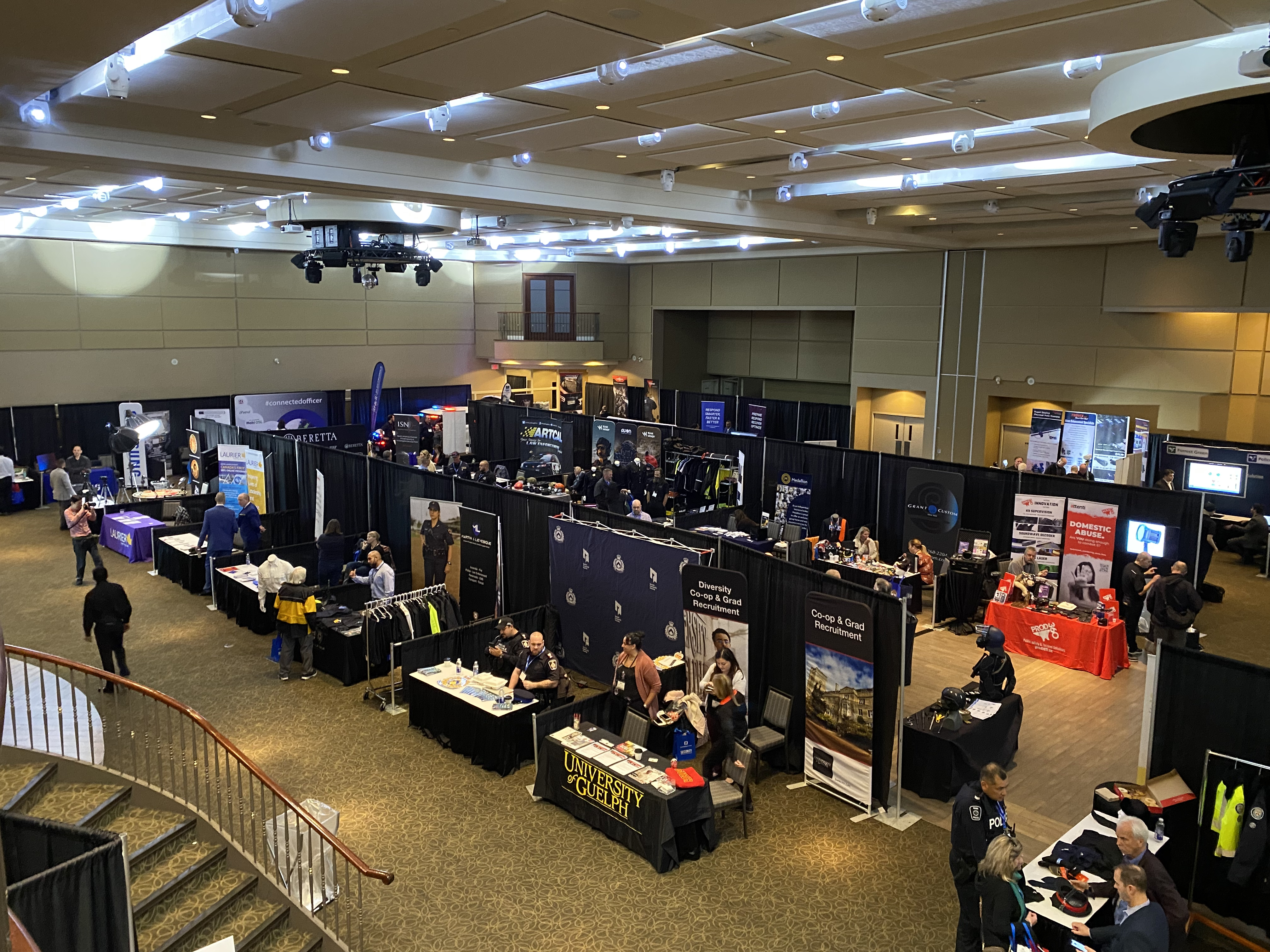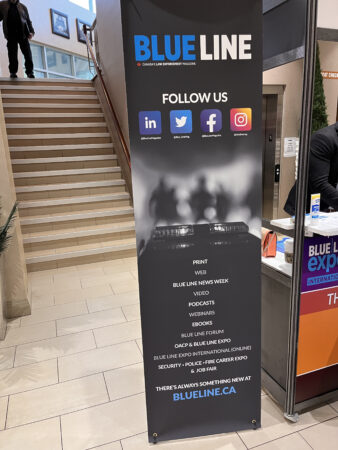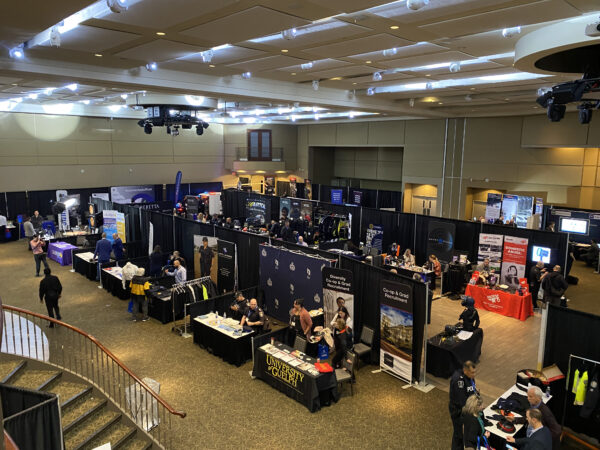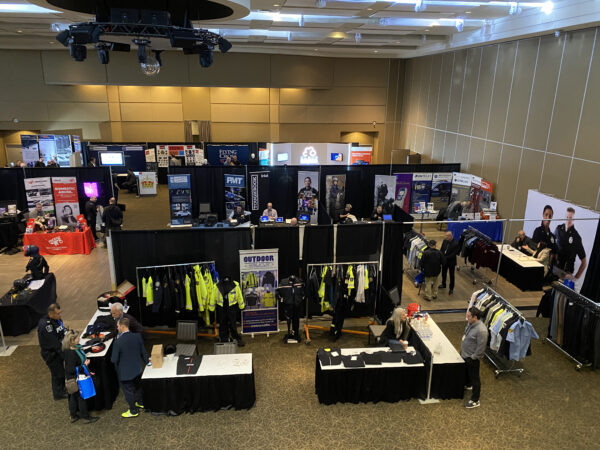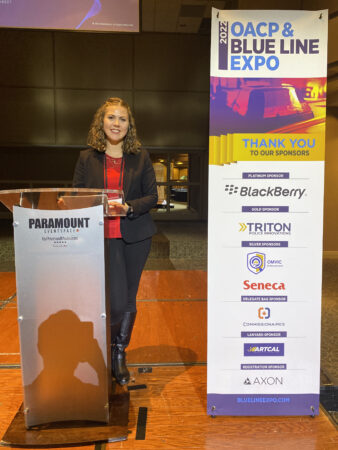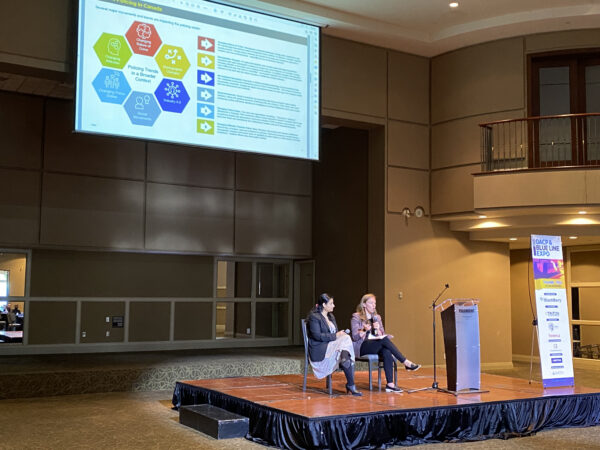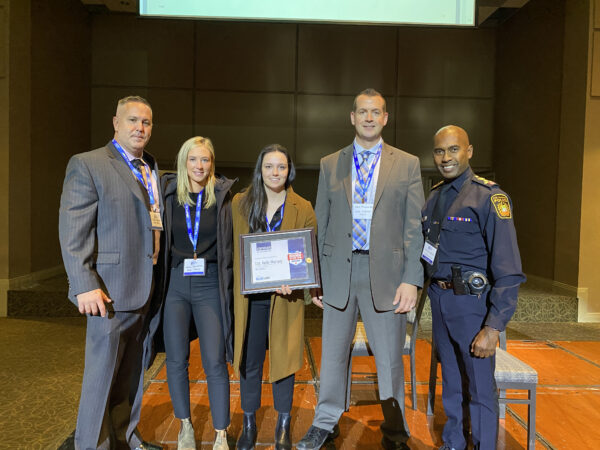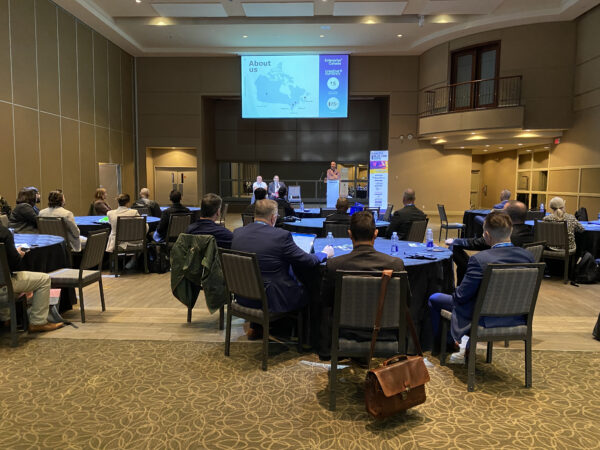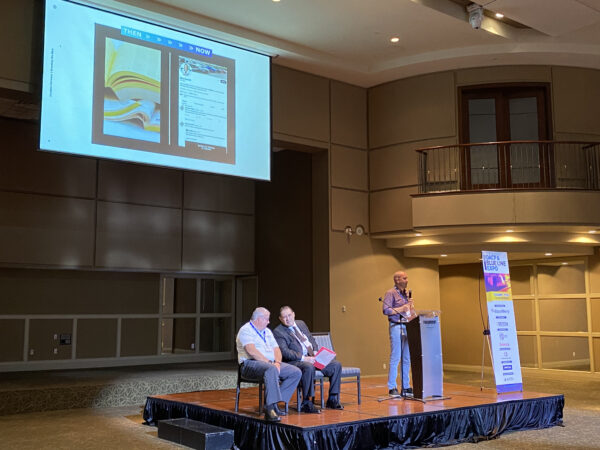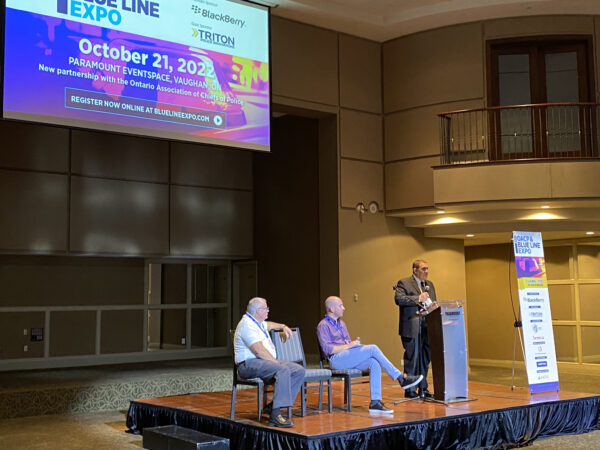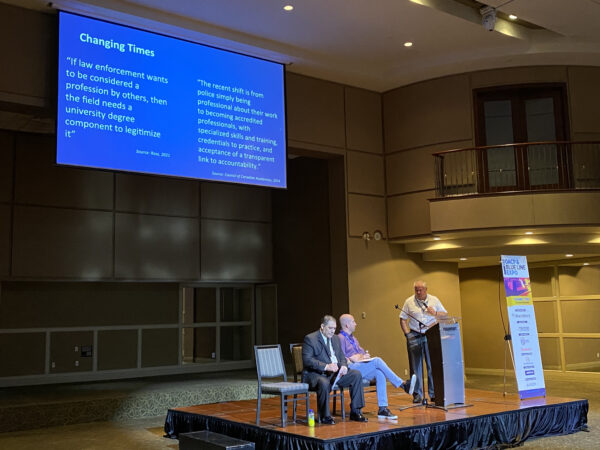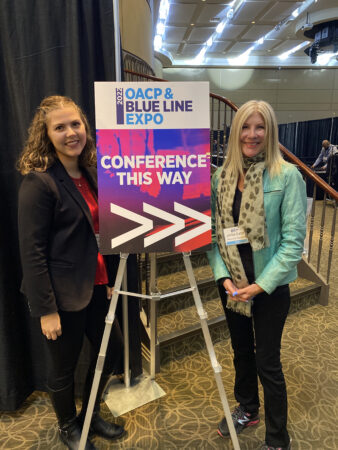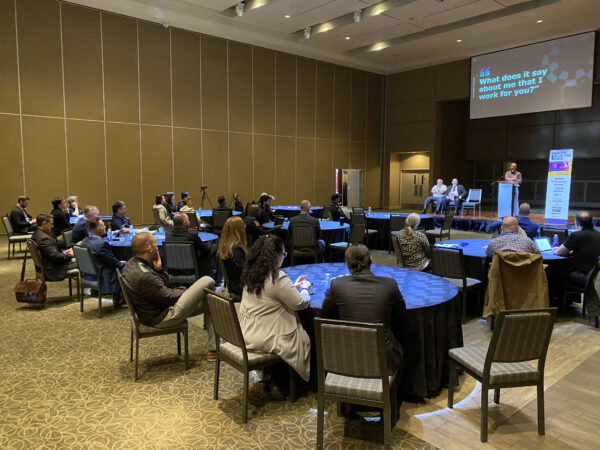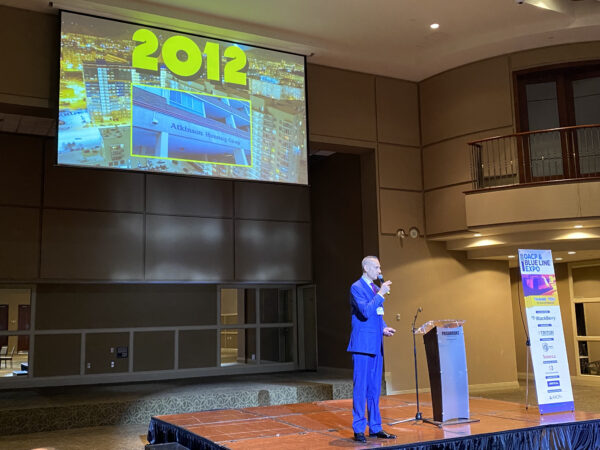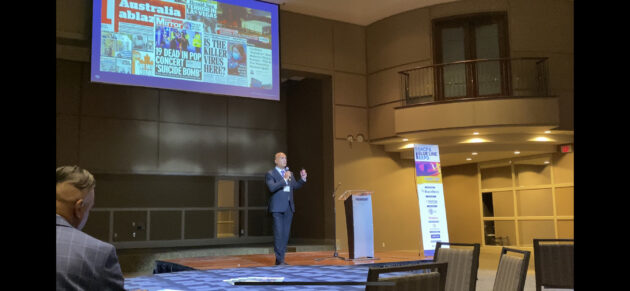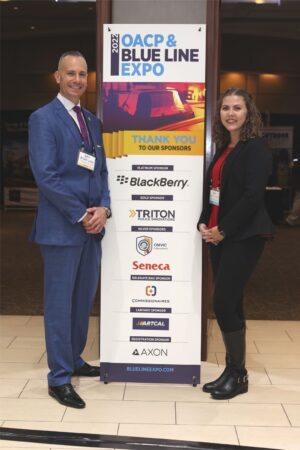
Canadian law enforcement experts come together to discuss hot topics and discover new products
On Oct. 21, Blue Line and the Ontario Association of Chiefs of Police (OACP) welcomed attendees to the OACP & Blue Line Expo at the Paramount EventSpace in Vaughan, Ont.
Over 65 vendors set up shop to show off the latest in technology, services and products from the law enforcement, corrections and security industries to over 170 attendees. This included police pistols, law enforcement vehicles, clothing and boots, drones, surveillance systems, first responder defibrillator systems, tactical gear, graphics for clothing and vehicles and so much more.
The event’s sponsors were Blackberry, Triton Police Innovations, OMVIC Enforcement, Seneca, Commissionaires, Axon, and Artcal Graphics & Printing.
On the conference side, visitors attended five sessions on some of the industry’s hottest topics: the economics of the post-COVID-19 era, recruiting to lead, mental health literacy, the importance of court considerations for law enforcement officers, and effective communication in coordinating a multi-agency major incident response.
The economics of the post-COVID-19 era
In our first session of the day, Lindsey Gray and Richa Kharbanda from PwC Canada spoke about how police services, other first responders and public service organizations will not be immune from consequences of the immediate economic outlook for the province of Ontario and Canada. They analyzed how pressures on the public sector are bound to increase as we emerge from the COVID-19 pandemic. The questions asked to the audience included, “Is a financial reckoning on the horizon?” and “Are police leaders and their organizations ready?”
Gray and Kharbanda leveraged data-driven insights to align and plan for the future. Beginning with a look at the impacts to policing in Canada—including the changing nature of crime, demographic changes, the changing attitudes towards police and other social movements—the two speakers then translated strategy into practical solutions. These solutions included mental health and wellness, race-based data collection projects, and hate crime predictive insights.
Recruit to lead
The recruit to lead panel was led by Dennis Matthews, president of Creative Currency, and two retired officers turned professors, Dr. Frank Trovato and Dr. Scott Blandford.
Dennis Matthews kicked off the session by looking at how recruitment is a marketing and branding feature. “Recruitment is a war for talent,” he stated. Police departments themselves are a brand, and therefore they need to put their “best foot forward” to attract the best candidates. Organizations need to interact with potential candidates where they spend their time, and this includes social media and the community in face-to-face interactions.
Dr. Frank Trovato spoke next, touching on how best to support the constable selection process and the importance of understanding the local needs in all communities. The best recruitment strategy is for police organizations to learn about their issues and then discuss and implement changes to improve, making a better employment space for all. As a reminder to the audience, Dr. Trovato said “You need to stay positive and keep looking for new people. Most importantly, look for them face-to-face.”
Dr. Scott Blandford finished the panel by speaking about the expectations of current day officers, and the difference between professionalism and professionalization for police. “Police professionalism classically refers to the ways in which individual police officers carry out their duties. Professionalization refers to the policing system,” said Dr. Blandford. He stated that the occupation of policing has yet to evolve into a formal profession. He concluded by suggesting that the expectation of police should be the same across the country, including lengths of education and levels of training.
Mental health literacy
The first afternoon session focused on mental health, and was delivered by Nick Halmasy, a registered psychotherapist who spent a decade in the fire service. He is also the founder of After the Call, a free-to-use online resource for mental health information. When it comes to mental health, Halmasy believes we are missing so much of the story, so much of the impact, and so much opportunity to engage and, potentially, divert mental health towards wellness instead of towards despair. Not having mental health literacy means that we are constantly questioning, swayed by and implementing programs and tools that may not work. The session aimed to improve the audience’s critical thinking on topics of mental health while challenging some of their beliefs. As Halmasy explained, “Literacy is understanding that symptoms by themselves are not necessarily bad. Literacy is simply understanding that things can change.”
The importance of court considerations for officers
In Sgt.-Special Constable Brian Lass’s session, he spoke about the “less exciting” part of the law enforcement profession: court. As he described it, an officer’s job is only just beginning at the time a respective charge is laid. The world of court is an integral and mandatory component of any officer’s tenure. Lass used an acronym (ROAD) to describe the goal of a conviction against a defendant: making the defendant take Responsibility for their actions, Ownership of their actions, assuming Accountability for their actions and, finally, using the charge as a Deterrence of their actions. The “commencement of proceeding” is just the beginning of the process, and everything surrounding it is of the utmost importance. Officers must remember this as they begin their investigations.
The critical importance of effective communication in coordinating a multi-agency major incident response
The day’s final session was focused on interoperability and was led by the event’s platinum sponsor, Blackberry. Chris Ullah, who is a recently retired Police Superintendent from Greater Manchester Police, lead the group through a discussion focused on communicating in major incidents, and how response times can be drastically reduced. “Why, with all this technology, can we not communicate effectively?” he asked. During those crucial first moments of a crisis, clear efficient communication across all responders is essential. Indeed, it can mean the difference between life and death.
Rookie of the Year award presentation
The annual Blue Line Rookie of the Year award recognizes and encourages a standard of excellence that exemplifies leadership as an activity not a position, and pride in service to the public. Its goal is to highlight promising new officers who are effectively paving the way for the policing of today and tomorrow, and creating positive waves among their peers, agencies, communities and beyond.
This year’s winner was announced in the June/July edition of Blue Line, but the award was presented at OACP & Blue Line Expo. Cst. Kelly Mariani of Peel Regional Police (PRP) came up to the stage to accept her award with her superiors Det. Todd Chapman and Acting S/Sgt. Mark Mazzocato.
When Cst. Mariani’s superiors nominated her for this award, they emphasized how she has shown a genuine connection in dealing with the public since beginning her career at PRP. Cst. Mariani was an ideal candidate for this award.
We extend our congratulations once again to Cst. Kelly Mariani and Peel Regional Police.
Gallery
See below for some photos from this year’s event:
Editor’s Note: A special thank you to all our attendees, sponsors, exhibitors and presenters at this year’s conference and expo. Remember to check out the hashtag #OACPBlueLineExpo2022 for more photos of the event. We can’t wait to see you again in 2023!
Print this page
